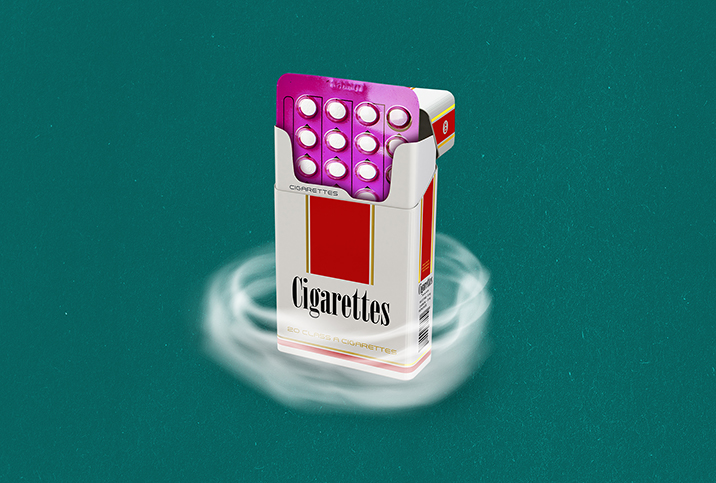Progestin-only Pills May Be More Effective Than Previously Believed

Progestin-only pills (POP), or "minipill," may be a more effective contraceptive than once thought, according to a new review of 54 studies and five decades of research.
What are progestin-only pills?
With perfect use, progestin-only birth control pills are thought to be 99 percent effective, the same as combination hormonal contraceptives, according to Cleveland Clinic. However, people aren't perfect and don't always remember to take their pill each day at the same time.
Errors such as missing a dose or taking it at the wrong time may affect efficacy. With this in mind, experts previously believed the medication was about 93 percent effective. So 7 in 100 women who took this form of birth control for a year, on average, would become pregnant.
The number of pregnancies may be close to two, suggested the March 2023 review. Like the previous estimate of 93 percent effectiveness, the approximation accounts for human error and reflects people who take it precisely as prescribed and those who use it incorrectly or inconsistently.
Why is the effectiveness of progestin-only pills so important?
The authors acknowledge their review has limitations and that more research is needed to evaluate minipills' effectiveness. Nonetheless, the results are promising, particularly in light of the U.S. Food and Drug Administration's (FDA) pending approval of an over-the-counter progestin-only pill, said Sarah Diemert, W.H.N.P., a Denver-based women's health nurse practitioner and the director of medical standards integration and evaluation at Planned Parenthood Federation of America (PPFA).
"This study is exciting in that it suggests progestin-only pills may be more effective than we have believed in the past, so patients who are not able to take combination methods or prefer to avoid estrogen for other reasons may be reassured that they are not on a less effective method," Diemert said.
No single method of birth control is best for every person, and some people may prefer different methods at different times.
Increased reliability could make the progestin-only pill a more popular method of birth control.
"It may also suggest that we do not need to be as concerned about the strict three-hour window as we have been in the past," Diemert said. "As we wait for FDA approval of an over-the-counter progestin-only pill, this study is really important to provide reassurance that it is a reliable pregnancy prevention method."
What should you know about the minipill study?
The pending FDA application was part of the reason the researchers were motivated to review the minipill's effectiveness, according to Carmela Zuniga, M.A., an associate research scientist at Ibis Reproductive Health in Cambridge, Massachusetts, and the study's lead author.
A Paris-based pharmaceutical company applied for FDA approval of an over-the-counter minipill last year.
Birth control pills are available without a prescription in more than 100 countries. But it would be a first in the United States, where the emergency morning-after pill is the only oral hormonal contraceptive available over the counter.
'There is a prevalent belief that minipills lose their effectiveness when not taken within a tight three-hour window, but little clinical data backs it up.'
"While many clinical trials have been conducted on a variety of POPs, a 2013 literature review concluded there was not enough evidence from randomized controlled trials to compare the efficacy rates of POPs to each other," she wrote in an email interview. "Given this finding, we aimed to conduct a literature review of POP effectiveness and efficacy rates reported by a range of study types."
Previous reviews on the effectiveness and efficacy of progestin-only pills have focused on few formulations and only included data from randomized controlled trials, Zuniga said. For this review, she and her cohorts included a wide range of pill formulations from all types of studies.
Acknowledging the limitations of non-randomized studies, researchers assessed all studies for biases that could influence results and focused on data from studies with a low or moderate risk of bias.
Their results indicate the median rate of unintended pregnancy with average, real-world minipill use was lower than anticipated. That finding held when evaluating data from all studies and when excluding ones with a high bias risk.
Zuniga said many prior studies were published 20 to 50 years ago. Researchers now have much more rigorous procedures for collecting data and reporting results.
Additionally, much of the existing literature on minipill effectiveness involved older birth control pill formulations.
"As the FDA considers a POP for over-the-counter status, findings from our review suggest that POPs may be more effective during typical use than currently believed, although more research is needed to confirm this," she said. "We hope future studies will explore if participant characteristics or behaviors influence these rates in any way.
"Such data could help people interested in using POPs understand the differences between various POPs formulations and make well-informed decisions about which one might be best for them."
How do progestin-only pills work?
Combination pills and other hormonal contraceptive methods such as the patch and vaginal ring contain two hormones: estrogen and progestin. Minipills only contain progestin.
Progestin-only pills thicken the cervical mucus, making it difficult for sperm to enter the uterus, said Michael Krychman, M.D.C.M., a Newport Beach, California-based OB-GYN and AASECT-certified sexual health counselor and supervisor at HerMD.
They also thin the uterine lining, or endometrium, to inhibit implantation and help further prevent pregnancy.
"If you take the minipill at the same time every day, it can be up to 99 percent effective," Krychman said. "However, if you skip pills or do not take the medication exactly as prescribed, its effectiveness will decline. No matter what dosing schedule you use, it is very important that you take this medication at the same time each day, 24 hours apart."
There are two different kinds of progestin-only pills available in the U.S., Krychman said. One of these solely contains norethindrone and must be taken within three hours daily for optimal efficacy.
This window is important because the effect of progestin-only pills on the cervical mucus could wear off, Diemert said.
The other option—this one contains norgestrel, desogestrel or drospirenone—blocks ovulation in addition to thickening the cervical mucus and thinning the uterine lining. With these formulations, the strict three-hour window may not apply.
"While it is important this medication also be taken at the same time each day, this medication allows for a flexible 24-hour missed pill window, should you miss your scheduled dosing," Krychman said.
What is the importance of the minipill dosing window?
Zuniga again cited the 2013 literature review of progestin-only pills, which also concluded there was insufficient evidence to compare minipills' efficacy to that of combined oral contraceptives.
Yet, she said, there remains a misconception that progestin-only formulations are less effective.
That might partly explain why just 4 percent of people capable of becoming pregnant choose this contraception method, Krychman said.
There is a prevalent belief that minipills lose their effectiveness when not taken within a tight three-hour window, but little clinical data backs it up, Zuniga said.
Moreover, research suggested delays longer than three hours don't affect efficacy with some progestin-only formulations, including norgestrel, desogestrel and drospirenone. Norgestrel is the formulation the FDA is currently considering for over-the-counter availability.
Krychman said Zuniga's findings might prompt more people to choose progestin-only pills and more healthcare providers to prescribe and advocate for them.
"Progestin-only pills have excellent efficacy, with a very high ability for pregnancy prevention with use within specific time windows," Krychman said.
What are the advantages of the progestin-only pill?
Experts said progestin-only pills have some distinct advantages over combination hormonal contraceptives. For one, because they don't contain estrogen, they can benefit people sensitive to estrogen or concerned about its potential effects.
Minipills don't increase the risk of high blood pressure or cardiovascular disease, per the American College of Obstetricians and Gynecologists (ACOG), Krychman said.
"Progestin-only pills are usually recommended for women who have high blood pressure, a history of deep vein thrombosis and those with cardiovascular disease," Krychman said.
"Progestin-only pills can also be used after childbirth and if you are breastfeeding."
Diemert added that they could be an appropriate choice for people over age 35 who smoke, folks who experience migraine with aura, and those with a heightened risk of blood clots or stroke.
They can be helpful for people with painful periods or a heavy monthly flow, Krychman said.
"Since progestin-only pills may alter bleeding patterns, women may experience reduced bleeding with each monthly period or may stop periods altogether," he added.
Progestin-only pills aren't the best choice for everyone.
Who shouldn't take progestin-only pills?
"Your healthcare professional may advise you not to take this type of contraception if you have a past or present diagnosis of breast cancer, have certain liver diseases, have unexplained uterine bleeding, or are taking certain medicines for tuberculosis, HIV/AIDS or those which control seizures," Krychman said.
Speak with your doctor to determine the best form of birth control for you.
The bottom line
Zuniga's research underlines that multiple kinds of safe and effective contraceptives can help prevent unintended pregnancy and promote better sexual and reproductive health overall.
More research of this kind could help to promote better awareness and access to birth control.
"Anyone who works in sexual and reproductive health will tell you that the more safe and effective birth control options there are available, the better," Diemert said. "We know that birth control isn't one-size-fits-all. No one method is best for every person, and some people may prefer different methods at different times in their lives, depending on existing health conditions, sexual relationships or other needs."


















